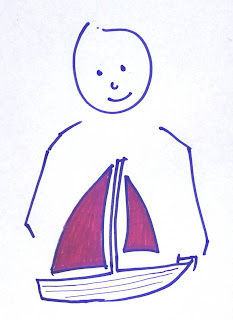Doubly Mine
 A story of Jo and his boat (based on Ephesians 2:1-10)
A story of Jo and his boat (based on Ephesians 2:1-10)Young Jo loved making things and he was very good with his hands. He decided to make a sailing boat. He searched for the right piece of wood. He spent hours shaping and crafting it. He smoothed it down, painted it and polished it. He found a stick that would do for the mast, and spent hours getting it just right. He stitched some material into sails.
When he had finished he held in his arms a work of art. He was so proud of what he had made. He was so proud of his boat. He calls her 'My Jewel'
 He takes his boat down to the local park, where there is a lake. He puts My Jewel on the water. She sails beautifully, just as she was made to sail.
He takes his boat down to the local park, where there is a lake. He puts My Jewel on the water. She sails beautifully, just as she was made to sail. But then a gust of wind catches her and blows her towards the other side. Jo runs round the lake, but just as he arrives, two older boys snatch My Jewel from the water and run off laughing.
But then a gust of wind catches her and blows her towards the other side. Jo runs round the lake, but just as he arrives, two older boys snatch My Jewel from the water and run off laughing.Jo tries running after them, but it is no good. He returns home broken hearted.
 About a month later, Jo is walking past the local junk shop. He looks in the window. There, among the broken tennis rackets and cars and old tools, he sees a boat - his boat. My Jewel is battered: her paint is scratched, her sail is torn, and she has a price tag, £30.
About a month later, Jo is walking past the local junk shop. He looks in the window. There, among the broken tennis rackets and cars and old tools, he sees a boat - his boat. My Jewel is battered: her paint is scratched, her sail is torn, and she has a price tag, £30.Jo walks into the shop. "That's my boat", he said, "I made it. But some boys stole it." The shopkeeper is having none of it. "I don't care who made it. I paid good money for that boat. You can have it for £30 and not a penny less".
Jo didn't have £30. He had £12.37. He asks his mum for some money, but she things are tight. There isn't anybody else, so Jo has to work to earn his £30.
 Jo cleans the neighbours cars; he cuts their grass; he cleans their windows. And everyday he walks past Junkies, gazes at My Jewel and says, 'I made you. You're mine'.
Jo cleans the neighbours cars; he cuts their grass; he cleans their windows. And everyday he walks past Junkies, gazes at My Jewel and says, 'I made you. You're mine'.It cost him a great deal. When his friends wished to meet up in town to go to the cinema, Jo had to say, "No". When he was offered a ticket to the match to see his beloved team, he said "No": someone had offered him a job cleaning their garden that afternoon. Every penny was saved.
 Finally, the great day comes. Jo has his £30. After school, he runs into town and, out of breath, he goes into the shop. He puts the money down on the counter. He says to the shopkeeper, "You wanted £30. Here is £30. I've paid the price. The boat is mine." The shopkeeper takes the money and gives him the boat.
Finally, the great day comes. Jo has his £30. After school, he runs into town and, out of breath, he goes into the shop. He puts the money down on the counter. He says to the shopkeeper, "You wanted £30. Here is £30. I've paid the price. The boat is mine." The shopkeeper takes the money and gives him the boat.Jo walks out of Junkies holding My Jewel tightly in his arms. And as he walks home, he looks at her and he says, "You're mine and you're mine. You're twice mine. You're doubly mine. I made you and I bought you."
 But this is not the end of the story. Indeed it is really only the beginning. My Jewel was not made to be thrown in a junk shop. She was not made to lie in a cupboard. She was made to sail. So although Jo has great plans for what he intends to do with her, just for now he does some emergency repairs and then he takes her to the lake. And Jo says to My Jewel, "I made you to sail. Now sail. But sail for me".
But this is not the end of the story. Indeed it is really only the beginning. My Jewel was not made to be thrown in a junk shop. She was not made to lie in a cupboard. She was made to sail. So although Jo has great plans for what he intends to do with her, just for now he does some emergency repairs and then he takes her to the lake. And Jo says to My Jewel, "I made you to sail. Now sail. But sail for me".
Comments
Post a Comment